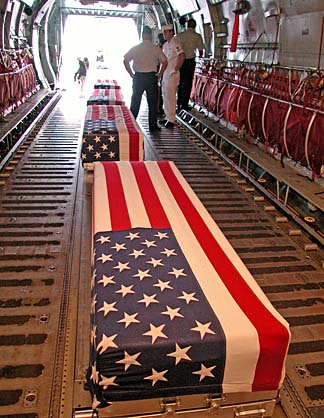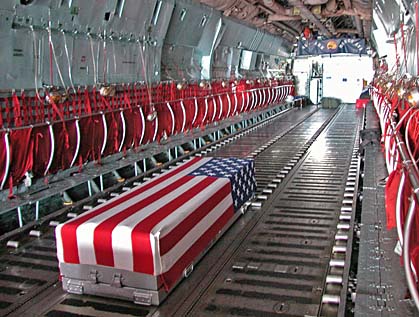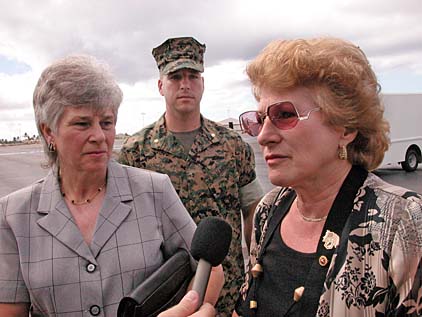

|
Coming home
A quest for a Marine missing in action
since 1968 ends with success
|
THE confession of a North Vietnamese soldier and the dog tag of a medic were key elements that helped crack a "cold case" of a missing serviceman, Marine 2nd Lt. Donald J. Matocha.
Matocha was 23 and not quite a year out of college when he was cut down on April 5, 1968, in Quang Tri province in Vietnam while on patrol with the 3rd Reconnaissance Platoon, Delta Company, 3rd Marine Division. He was listed as missing in action for 36 years.
Yesterday, his sisters, Loretta Eiben and Linda Masur, who kept the search alive after their parents died, were honored at a Hickam Air Force Base ceremony. The occasion was the repatriation ceremony for four other sets of remains -- two from World War II and two from the Korean War -- which arrived at Hickam on National POW/MIA Recognition Day.

|
The remains were transported to the Joint POW/MIA Accounting Command's Central Identification Laboratory, where the final forensic examination will be done. Matocha's remains had also been identified at the laboratory earlier this year.
Matocha's sisters will return today to Texas, where Matocha will receive a hero's homecoming tomorrow when his remains arrive at Austin-Bergstrom International Airport and are taken by a Marine Corps honor guard and local veterans to his hometown of Smithville. He will be buried with full military honors next to his father, mother and brother on Saturday.
There are still more than 1,800 Americans missing from the Vietnam War.
Johnie Webb, the Joint POW/MIA Accounting Command's senior adviser, said the search for Matocha's "was a cold case" since 1999 when Eiben asked him and other officials to reopen it in 2002.
"It took a lot of digging by us and researching the North Vietnamese army's order of battle to determine what units were there," Webb said.
Webb said they were able to find a North Vietnamese soldier who admitted he buried Matocha's body with the help of another soldier.
The North Vietnamese soldier also showed military investigators what he thought was Matocha's grave site.
"He said then that it was time to let people know what they did," said Eiben, a schoolteacher who lives in San Marcos, Texas.

|
Eiben's son, Stacy Eiben, who helped by researching his uncle's records, said Matocha was part of "Team Dallas Girl" in 1968, which had been sent to investigate caves.
"When they were in the cave, the enemy opened fire," he said. "My uncle was hit almost immediately. When they went back to try to recover his body, the blast from the helicopter rotor blades pushed his body into a small ravine."
A medic also tried to reach Matocha, but was wounded and had to be taken out by helicopter.
More attempts were made to try to recover Matocha's body during the next several days. Each time, heavy enemy fire turned back the Marines, killing several.
"Finally after a few weeks, they were able to get back to the site, but there was no body to be found," Masur said.
Webb said another breakthrough came last year during the last excavation mission, when the wounded medic's dog tags were recovered.
Using DNA samples from two of Matocha's sisters and his nephew, a positive identification was made earlier this year.
"It's been a long vigil," said Masur, who lives in Rockdale, Texas. "I am thankful to finally see fulfillment rather passing this onto our children."
Loretta Eiben added: "We're overjoyed. We're glad they were able to come through for us."
|
www.jpac.pacom.mil